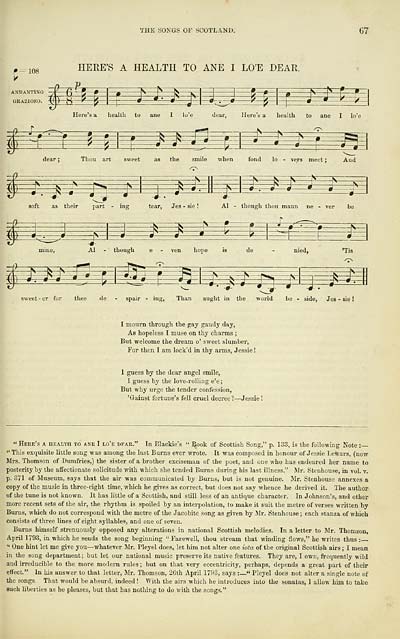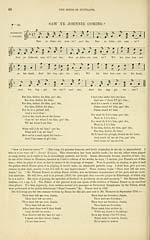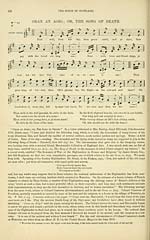Glen Collection of printed music > Printed music > Wood's edition of the songs of Scotland
(91) Page 67 - Here's a health to ane I lo'e dear
Download files
Complete book:
Individual page:
Thumbnail gallery: Grid view | List view

THE SONGS OF SCOTLAND.
67
108
HERE'S A HEALTH TO ANE I LO'E DEAR.
ANDANTLNO
ORAZIOSO.
SB
fefc=S
* * *-~—0 V- — tr
^m£
Here's a health to ane I lo'e dear, Here's a health to ane I lo'e
s=&
^:
*=3e
B
dear ; Thou art sweet as the smile when fond lo - vers meet ;
And
sweet - cr for thee de
spair - ing, Than aught in the world be - side, Jes - sie !
I mourn through the gay gaudy day,
As hopeless I muse on thy charms ;
But welcome the dream o' sweet slumber,
For then I am lock'd in thy arms, Jessie !
1 guess by the dear angel smile,
I guess by the love-rolling e'e ;
But why urge the tender confession,
'Gainst fortune's fell cruel decree ? — Jessie !
" Here's a health to ane I lo'e dear." In Blackie's " Book of Scottish Song," p. 133, is the following Note :—
" This exquisite little song was among the last Burns ever wrote. It was composed in honour of Jessie Lewars, (now
Mrs. Thomson of Dumfries,) the sister of a brother exciseman of the poet, and one who has endeared her name to
posterity by the affectionate solicitude with which she tended Burns during his last illness." Mr. Stenhouse, in vol. v.
p. 371 of Museum, says that the air was communicated by Burns, but is not genuine. Mr. Stenhouse annexes a
copy of the music in three-eight time, which he gives as correct, but does not say whence he derived it. The author
of the tune is not known. It has little of a Scottish, and still less of an antique character. In Johnson's, and other
more recent sets of the air, the rhythm is spoiled by an interpolation, to make it suit the metre of verses written by
Burns, which do not correspond with the metre of the Jacobite song as given by Mr. Stenhouse; each stanza of which
consists of three lines of eight syllables, and one of seven.
Burns himself strenuously opposed any alterations in national Scottish melodies. In a letter to Mr. Thomson,
April 1793, in which he sends the song beginning " Farewell, thou stream that winding flows," he writes thus :
" One hint let me give you — whatever Mr. Pleyel does, let him not alter one iota of the original Scottish airs ; I mean
in the song department; but let our national music preserve its native features. They are, I own, frequently wild
and irreducible to the more modern rules ; but on that very eccentricity, perhaps, depends a great part of their
effect." In his answer to that letter, Mr. Thomson, 26th April 1793, says :_" Pleyel does not alter a single note of
the songs. That would be absurd, indeed ! With the airs which he introduces into the sonatas, 1 allow him to take
such liberties as he pleases, but that has nothing to do with the songs."
67
108
HERE'S A HEALTH TO ANE I LO'E DEAR.
ANDANTLNO
ORAZIOSO.
SB
fefc=S
* * *-~—0 V- — tr
^m£
Here's a health to ane I lo'e dear, Here's a health to ane I lo'e
s=&
^:
*=3e
B
dear ; Thou art sweet as the smile when fond lo - vers meet ;
And
sweet - cr for thee de
spair - ing, Than aught in the world be - side, Jes - sie !
I mourn through the gay gaudy day,
As hopeless I muse on thy charms ;
But welcome the dream o' sweet slumber,
For then I am lock'd in thy arms, Jessie !
1 guess by the dear angel smile,
I guess by the love-rolling e'e ;
But why urge the tender confession,
'Gainst fortune's fell cruel decree ? — Jessie !
" Here's a health to ane I lo'e dear." In Blackie's " Book of Scottish Song," p. 133, is the following Note :—
" This exquisite little song was among the last Burns ever wrote. It was composed in honour of Jessie Lewars, (now
Mrs. Thomson of Dumfries,) the sister of a brother exciseman of the poet, and one who has endeared her name to
posterity by the affectionate solicitude with which she tended Burns during his last illness." Mr. Stenhouse, in vol. v.
p. 371 of Museum, says that the air was communicated by Burns, but is not genuine. Mr. Stenhouse annexes a
copy of the music in three-eight time, which he gives as correct, but does not say whence he derived it. The author
of the tune is not known. It has little of a Scottish, and still less of an antique character. In Johnson's, and other
more recent sets of the air, the rhythm is spoiled by an interpolation, to make it suit the metre of verses written by
Burns, which do not correspond with the metre of the Jacobite song as given by Mr. Stenhouse; each stanza of which
consists of three lines of eight syllables, and one of seven.
Burns himself strenuously opposed any alterations in national Scottish melodies. In a letter to Mr. Thomson,
April 1793, in which he sends the song beginning " Farewell, thou stream that winding flows," he writes thus :
" One hint let me give you — whatever Mr. Pleyel does, let him not alter one iota of the original Scottish airs ; I mean
in the song department; but let our national music preserve its native features. They are, I own, frequently wild
and irreducible to the more modern rules ; but on that very eccentricity, perhaps, depends a great part of their
effect." In his answer to that letter, Mr. Thomson, 26th April 1793, says :_" Pleyel does not alter a single note of
the songs. That would be absurd, indeed ! With the airs which he introduces into the sonatas, 1 allow him to take
such liberties as he pleases, but that has nothing to do with the songs."
Set display mode to: Large image | Transcription
Images and transcriptions on this page, including medium image downloads, may be used under the Creative Commons Attribution 4.0 International Licence unless otherwise stated. ![]()
| Special collections of printed music > Glen Collection of printed music > Printed music > Wood's edition of the songs of Scotland > (91) Page 67 - Here's a health to ane I lo'e dear |
|---|
| Permanent URL | https://digital.nls.uk/91338835 |
|---|
| Description | Scottish songs and music of the 18th and early 19th centuries, including music for the Highland bagpipe. These are selected items from the collection of John Glen (1833 to 1904). Also includes a few manuscripts, some treatises, and other books on the subject. |
|---|
| Description | The Glen Collection and the Inglis Collection represent mainly 18th and 19th century Scottish music, including Scottish songs. The collections of Berlioz and Verdi collected by bibliographer Cecil Hopkinson contain contemporary and later editions of the works of the two composers Berlioz and Verdi. |
|---|

